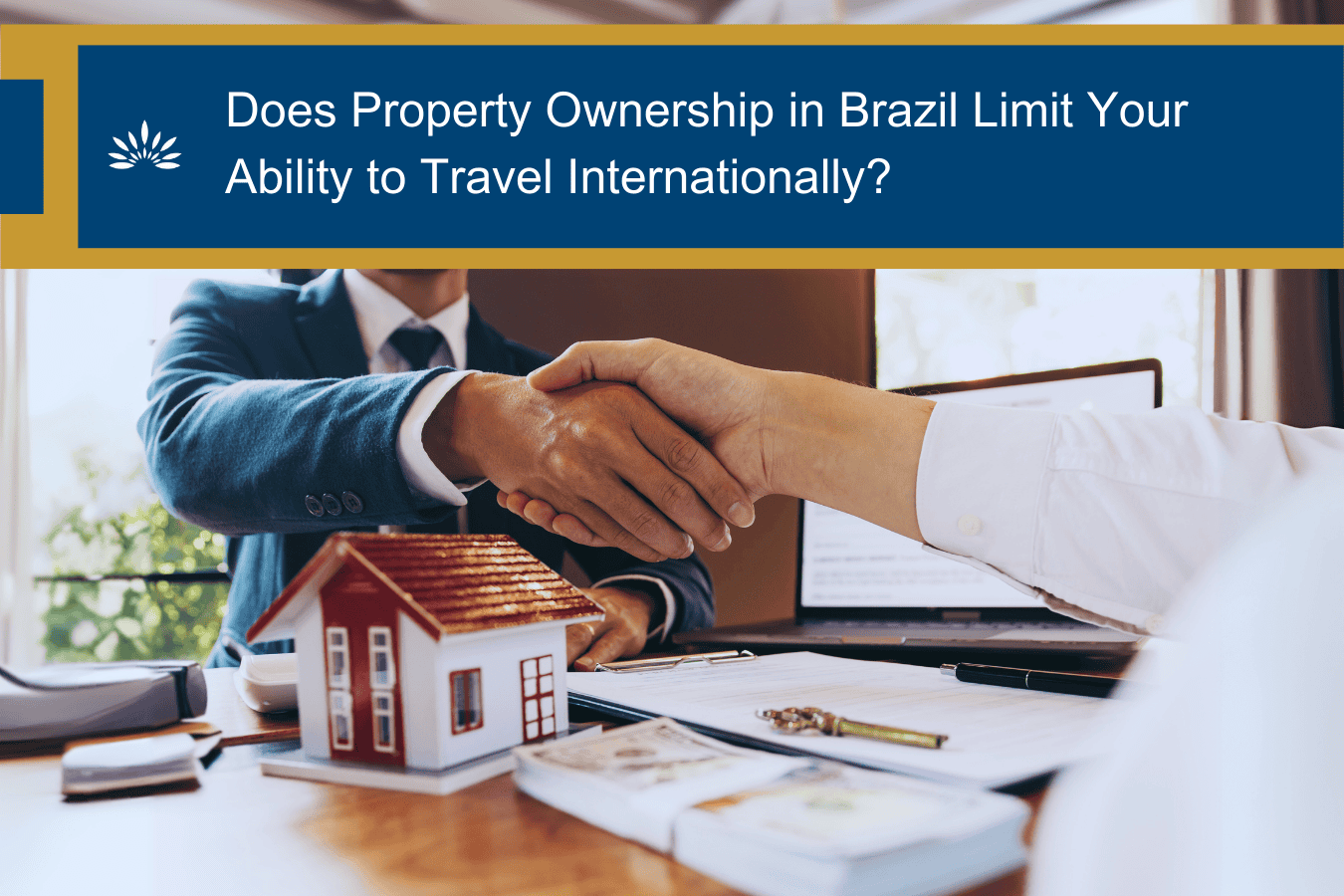Property Ownership in Brazil and Your Travel Freedoms
Curious if having a home base in Brazil might affect your ability to roam the globe? This guide unveils everything you need to know, reassuring you that owning property in Brazil won’t clip your international wings. Stay tuned for practical insights on balancing real estate investments with your wanderlust.
Picture yourself relaxing on a breezy balcony overlooking Rio de Janeiro’s famous Copacabana Beach. The sun is setting, painting the sky with orange and pink hues. Two neighbors are chatting in the background, debating whether owning property in Brazil will somehow tie them down. One says, “I’ve always dreamed of owning real estate near the sea. But does property ownership here mean I can’t travel as freely as before?” The other shrugs, uncertain. If you’ve ever asked a similar question—whether Brazil’s real estate regulations or visa status requirements impose restrictions on your ability to roam the globe—you’re not alone.

In this comprehensive, reader-friendly guide, we’ll explore the reality of owning real estate in Brazil— check out options here—and how it impacts your Brazil travel habits. We’ll cover everything from the legal frameworks that guide investors in real estate to the role of property management solutions. Plus, you’ll discover how property taxes, residency visa applications, and the choice of hiring property management companies or a property management service can fit into your jet-setting lifestyle. By the end, you’ll see how owning property in Brazil generally does not restrict your international mobility. In fact, with the right knowledge and planning, you can enjoy a home base in this vibrant country while still exploring the rest of the world.
1. Why Brazil Attracts Investors in Real Estate
Brazil is an appealing destination for investors in real estate for many reasons: scenic beaches, diverse cities, and a lively culture. Cities like São Paulo and Rio de Janeiro act as financial and cultural hubs, while coastal regions like Bahia and Florianópolis lure those who crave a laid-back atmosphere. This variety makes the country suitable for different investment goals, whether you want a vacation home, a long-term rental property, or a place to retire.
When foreigners consider owning property in Brazil, they often wonder if Brazil travel will become complicated. But rest assured, real estate regulations in Brazil typically do not restrict your freedom to move. If you’re clear on your visa status, you can pop in and out of the country without additional constraints.
2. Understanding Property Ownership vs. Residency Visa
One key piece of the puzzle is separating property ownership from your residency visa. Owning an apartment, house, or piece of land in Brazil does not automatically grant you residency. Conversely, it also doesn’t obligate you to stay in the country for a specific number of days per year unless your particular visa status says so. Instead, think of your property as an asset—much like real estate holdings you might have in other countries. You own it, but you’re free to travel wherever and whenever you wish, as long as you respect Brazilian immigration rules or standard passport controls.
3. Getting to Know Real Estate Regulations and Processes
Owning property in Brazil involves understanding the foundational rules that govern foreign ownership, registrations, and local zoning. Let’s break down the essentials.
3.1. Legal Framework for Foreign Buyers
Brazil’s real estate regulations generally allow foreigners to buy properties in urban areas. Some restrictions apply in rural zones or near international borders, mostly for security and land-use reasons. Even in special cases, there is no rule demanding you remain within Brazil’s borders. Consult an attorney—find one here—for unique property types.
3.2. Property Deeds and Registrations
Owning property in Brazil involves signing a deed (escritura) and registering it with the local notary office. While the deed outlines your property ownership, it doesn’t impose any travel restrictions. You’re free to finalize paperwork and leave the country as you wish.
3.3. Zoning and Building Codes
Depending on the municipality, local zoning laws can affect how you develop or renovate your property. However, these rules focus on land usage and architectural standards, not your physical presence or visa status.
4. Key Question: Does Property Ownership Limit Your Travel?
Short answer: No. The most important takeaway is that owning property in Brazil does not prevent you from traveling internationally. Your freedom to leave or re-enter the country depends on your citizenship and visa status, not on whether you have real estate holdings in Rio, São Paulo, or Bahia.
5. Understanding Visa Status vs. Real Estate Holdings
A common misconception arises when people assume that once they buy Brazil real estate, they must remain in the country. In reality, the Brazilian government doesn’t require property owners to stay put unless your specific residency visa states otherwise.
5.1. Financial Obligations vs. Physical Presence
While your ability to travel remains unhindered, you do have certain financial obligations like property taxes (IPTU) and possible homeowner’s association fees. These are monetary ties, not physical ones.
6. Managing Your Property from Afar
6.1. The Rise of Property Management Companies
Many international owners hire property management companies to handle their Brazil-based properties while they’re traveling. This allows you to maintain a steady income stream without being on-site.
6.2. Property Management Solutions: What They Include
Property management services can be tailored to your needs, from full-service packages that handle everything to partial services for occasional tasks. This setup ensures you can travel freely.
6.3. Balancing Costs and Convenience
Management fees reduce net rental income but can save you time, money, and stress in the long run. Consider it an investment in peace of mind.
7. Exploring Different Visa Paths
7.1. Tourist Visa Basics
Owning property during your short stays is perfectly legal. However, once your tourist visa expires, you must leave or extend it if the law allows. Your property ownership doesn’t grant extra days.
7.2. Residency Visa Through Investment
Brazil’s investor visa program can include real estate investments if you commit enough capital. While it grants extended stay rights, it doesn’t trap you in the country; you can still travel freely.
7.3. Other Types of Visa Status
Retirement visas, work visas, or family reunification visas may require a specific in-country presence. Failing to meet it might affect your visa but not your property ownership or global mobility.
8. Financial Considerations: Taxes, Fees, and More
8.1. Breaking Down Property Taxes
Urban areas levy IPTU. Non-payment leads to financial penalties, but not travel restrictions. Pay on time to avoid legal complications.
8.2. Renting Out Your Property
You must declare rental income according to Brazilian tax laws. None of these rules force you to remain in-country to manage your property.
8.3. Currency Exchange and Bank Accounts
Many foreign owners maintain local bank accounts to handle bills. This is a logistical convenience, not a legal requirement to stay in Brazil.
9. Real-Life Stories: How Others Manage Their Properties and Travels
Below are scenarios that illustrate how various owners juggle Brazil real estate with international travel.
Scenario 1: The Digital Nomad Landlord
Felipe, a Portuguese citizen, purchased an apartment in São Paulo. He lives there half the year and travels the rest. During his absence, he rents it out via short-term platforms. A property management service handles everything in his stead.
Scenario 2: The Retiree Couple with a Residency Visa
Linda and John, retirees from the U.S., spend eight months in their Bahia beachfront condo and four months visiting family abroad. Their investor residency visa allows extended stays, but does not restrict them from leaving.
Scenario 3: The Entrepreneur Investor
Akira from Japan runs a tech startup in Rio. He qualified for an investor residency visa by purchasing commercial property. Frequent international travel for conferences is never an issue, as his property is managed locally.
Comparison Table: Travel Flexibility for Property Owners
| Aspect | Brazil | United States | Europe (Schengen) |
|---|---|---|---|
| Travel Restrictions Based on Property | None; visa status governs travel. | None; immigration laws apply. | None; Schengen rules still apply. |
| Residency Visa Requirements | Some investor/retirement visas have min. presence rules. | EB-5 and others grant residency but no forced stay. | Golden Visas require some presence, not 24/7 stay. |
| Property Taxes | IPTU in urban areas; no effect on exit/entry. | Varies by state; no travel impact. | Council/Property taxes don’t restrict movement. |
| Property Management Options | Widely available; ideal for absentee owners. | Common to hire managers for rentals. | Popular in tourist cities; fosters travel freedom. |
| Effect on Citizenship | Property ownership doesn’t grant citizenship automatically. | Owning property doesn’t confer citizenship. | Citizenship requires separate formal process. |
10. Neighborhood Highlights for Potential Property Ownership
10.1. Rio de Janeiro
Rio’s iconic beaches and cultural scene make it an attractive spot. Demand for rentals is high, and the international airport ensures easy travel options.
10.2. São Paulo
A business and cultural hub. Upscale neighborhoods like Jardins or Vila Olímpia offer strong rental markets and quick global flight connections.
10.3. Bahia
Known for its Afro-Brazilian heritage and scenic beaches. Ideal for a laid-back lifestyle or short-term rentals, with no travel constraints imposed.
10.4. Florianópolis
Nicknamed “Floripa,” this island city is a blend of nature and modern living. Great for surfing, tech startups, and quick domestic flights.
Does Owning Real Estate in Brazil Limit Your Global Mobility?
After reviewing how property ownership, property taxes, real estate regulations, property management companies, and visa status intersect, the conclusion is clear: owning property in Brazil does not tether you to the country. You can finalize a property purchase and then hop on a plane without worrying about hidden travel constraints.
Final Answer
Does property ownership in Brazil limit your ability to travel internationally? No, it does not. Your freedom to leave or enter depends on your visa status and citizenship, not your real estate holdings.
Conclusion: Enjoy the Best of Both Worlds
What’s your biggest concern about investing in Brazil? Let us know in the comments!
For professional support, contact Camila Saunier International Realty to explore your real estate options or Oliveira Lawyers for legal assistance. Together, they’ll help make your Brazilian property dreams a reality.
Brazil provides a unique blend of culture, scenic beauty, and real estate opportunities. Purchasing property here doesn’t shackle your travel freedoms. You remain bound by your visa conditions—nothing more. With the right planning, your Brazil home base can be the launchpad to explore the rest of the globe.
12. Frequently Asked Questions (FAQs)
12.1. Does property ownership in Brazil force me to stay in the country?
No. Owning property in Brazil doesn’t impose mandatory stays. Your freedom to travel depends on your visa status, not on real estate holdings.
12.2. Can property management companies handle all aspects of my home while I’m abroad?
Yes. Many property management solutions oversee maintenance, rent collection, and even bill payments, freeing you to travel.
12.3. Do real estate regulations change if I’m a foreigner?
Generally, no. Brazil welcomes foreign buyers in urban areas. Some rural or border zones have unique rules, but they don’t restrict your global mobility.
12.4. Will owning a home in Brazil automatically give me a residency visa?
No. Owning real estate does not grant automatic residency, though certain investment thresholds can qualify you for an investor visa.
12.5. What about property taxes—will they limit my ability to travel?
Failing to pay taxes can lead to legal or financial issues, but it won’t bar you from leaving Brazil.
12.6. Can I rent out my property if I don’t live there year-round?
Absolutely. Many foreign owners rent their properties to short-term or long-term tenants, following local regulations and paying necessary taxes.
12.7. Does owning property in Brazil change my visa status?
No. Your visa status is governed by immigration laws, not property ownership.
12.8. Are there any hidden rules about owning real estate and traveling abroad?
None. Brazil’s real estate laws focus on ownership rights and land usage, not international mobility.
12.9. Which locations are best for a second home or investment?
Popular spots include Rio de Janeiro, São Paulo, Bahia, and Florianópolis. Each caters to different lifestyles and investment goals.
12.10. Is hiring a property management service mandatory?
It’s not mandatory, but highly recommended if you won’t be in Brazil regularly. This ensures your property is maintained and issues are handled promptly.
12.11. Do I need to be fluent in Portuguese to buy property or deal with property taxes?
Fluency helps, but isn’t required. Many agents, lawyers, and managers cater to English speakers. You can also hire translators.
12.12. How does an investor residency visa work if I invest in Brazilian real estate?
An investor visa usually requires a minimum investment in Brazilian businesses or property. Once approved, you enjoy extended stay rights without sacrificing your ability to travel freely.
Looking for Expert Guidance? Let Us Help!
[email protected]
+55 (21) 4042-0633
+1-214-438-3777





